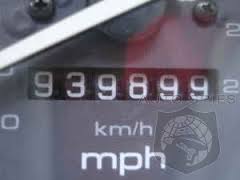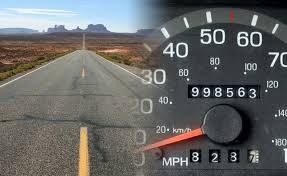It’s an oft-asked question when it comes time to shop for a second hand car. If there are lots and lots of miles (or kilometres) on the odometer, should you walk away? Are high miles too many miles and does a six-figure readout mean that the car is on its last legs? What exactly is good mileage for used car?
Historically, this was certainly the case. Back in the eighties and into the nineties, cars were quite simply not as robustly built as they are now. Testing regimes were not as punishing, nor were factory-fit tolerances as fine as they now are. As with almost any mechanical object, a car and its components are ‘lifed’ – which is to say that they are designed to have an expected service life of a given number of miles or kilometres, assuming a reasonable regime of care and servicing. Think of it as a sell-by date for oily metal bits.
So, those eighties and nineties cars were really only expected to last until they were about 100,000-miles, or 162,000km old. Doesn’t sound like much, and isn’t but that’s a reflection of the general build quality standards around at the time.
Mileage may not mean the car is too old
 It doesn’t necessarily mean that the cars were junk after that period. Clearly, cars which were carefully looked after and regularly serviced, and once in a while had major components replaced, could run for a lot longer. There is a Saab in the Wisconsin Automotive Museum which has racked up a verified 1,000,000-miles. That’s a million miles, not kilometres. VW has a million-mile Beetle in its museum, while there are a couple of a Passats and at least one Volvo P1800 that have passed the million-mile barrier.
It doesn’t necessarily mean that the cars were junk after that period. Clearly, cars which were carefully looked after and regularly serviced, and once in a while had major components replaced, could run for a lot longer. There is a Saab in the Wisconsin Automotive Museum which has racked up a verified 1,000,000-miles. That’s a million miles, not kilometres. VW has a million-mile Beetle in its museum, while there are a couple of a Passats and at least one Volvo P1800 that have passed the million-mile barrier.
Surely the all-time champion is the 240D saloon in the Mercedes-Benz museum, though. Originally sold in Greece, it has racked up 2.8-million miles and is still in perfect running order. Imagine putting that figure on your classified advert…
So, with care, cars can easily last a lot, lot longer than their original supposed lifetime. And the news gets better. The massive improvements in technology and engineering since the turn of the century, aided and abetted in no small part by the increasing power of computers and innovations such as Toyota’s ‘Kaizen’ philosophy of constant, incremental improvements (a philosophy swiftly adopted by most of the rest of the car industry) means that the expected lifetime of a car is now creeping up to more than 300,000km, or 200,000-miles. In some cases, Volvo for one, car makers boast that their cars are ‘lifed’ for as much as 400,000km.
So, realistically, any mileage less than, say, 200,000km (which is 124,000-miles) would suggest that a car, any car, still has plenty of life left in it.
The mileage/age dilemma
 Of course, all car mileage is not equal and this is where things get tricky. The classic dilemma is the choice between an older car with low miles or a newer car with high mileage – which one is better? The only answer is to delve into each car’s history. If the higher mileage car has done most of its miles on motorways (nowadays a distinct possibility in the Irish market, and one which our fathers and grandfathers couldn’t even take into account) then the higher miles could actually have been better for the car. There will have been less wear and tear on items such as clutches, brakes and gearboxes and, better still, the engine will have been operating in its preferred mean temperature range for most of the time, further reducing wear and tear. In the case of the diesel cars, that goes double and there won’t be any worries about clogged up particulate filters.
Of course, all car mileage is not equal and this is where things get tricky. The classic dilemma is the choice between an older car with low miles or a newer car with high mileage – which one is better? The only answer is to delve into each car’s history. If the higher mileage car has done most of its miles on motorways (nowadays a distinct possibility in the Irish market, and one which our fathers and grandfathers couldn’t even take into account) then the higher miles could actually have been better for the car. There will have been less wear and tear on items such as clutches, brakes and gearboxes and, better still, the engine will have been operating in its preferred mean temperature range for most of the time, further reducing wear and tear. In the case of the diesel cars, that goes double and there won’t be any worries about clogged up particulate filters.
Lower mileage cars may look tempting, but if most or all of those miles have been around town, or on country roads, then the wear and tear will be much higher. Brakes will have been used more, clutches will be more worn down and suspension will have taken more of a pounding. The small number on the clock could be hiding a whole lot of problems.
And that’s without even thinking of clocking. Clocking, or turning back the car’s mileage to make it appear more valuable, has thankfully, only recently, been made illegal, not least thanks to a campaign from ourselves at Motorcheck to make it so. Nevertheless, it still goes on and is still worryingly easy to do, so again, low mileage does not mean a better car. If the mileage is lying, it’s likely to be significantly worse than an honest high-miler.
The best solution
So, what’s the solution? Simple – stop fixating on mileage because, by and large, it’s pointless. Spend much more time focusing on a car’s history and servicing and you’ll do much better. Care and attention are far more important than the distance travelled. Also, consider a car history check from a reputable provider.